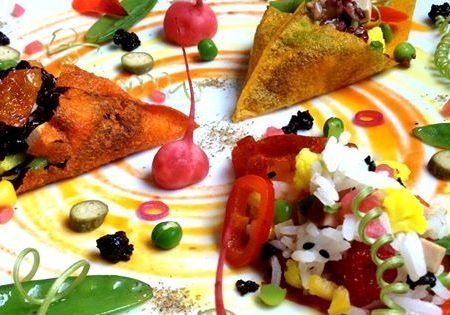As with omnivorous cuisine, in the vegan one too, a profound understanding of raw materials, of processing techniques and styles of cooking is important, because in order to prepare a good vegan dish, the simple act of removing animal ingredients is not enough. It is essential to decide which the main ingredients will be, on the basis of their character and their intrinsic potential, without following the “surrogate” effect. The large use of pre-processed products (roasted seitan, or sliced or made into chops) makes the work of a restaurateur easier but limits the development of an independent language in vegan cuisine, which, in fact, deserves its own identity. A dish, presented only in familiar shapes and flavours, will be favourably accepted by clients who are not ready to novelty but a similar approach should represent a compromise, not an end result.

Among the lessons that should be part of the knowledge of every cook (and even more so in the case of those who want to introduce high quality vegan menus) there are those regarding nutrition and food technologies. In nature there is no defined separation between ingredients that are rich in proteins, amides and fats because whole cereals, legumes, vegetables, fresh fruit and seeds all contain all these nutrients (plus vitamins, enzymes and minerals), even though the proportions vary. The problem arises when man transforms, processes, refines and often impoverishes this food that was originally balanced and complete in its nutritional potential. Removing germs and fibres from cereals in order to later find some ingredient that would integrate these is a paradox. This doesn’t mean that a menu conceived with cereals, legumes (or derivatives), vegetables and seeds is necessarily a balanced one. The proportion, integrity and freshness of the raw materials are the most important factors.
Having overcome these prejudgements, we need to consider some other, more practical, aspects. The research of variety implies the use of raw materials that are usually little used and are often hard to find or have a high cost. Even though the principle of local product needs to be followed, some ingredients coming from afar enrich vegan cuisine with flavours and precious nutritional elements, such as seaweeds, today rarely used in Italy, oily seeds such as cashew nuts, fermented products derived from soy or vegetables and fruits, such as
umeboshi.
The understanding of the food cultures of other people is as important as the attempt to self-produce natural, healthy and not over-processed food. This possibility needs to be considered and analysed by comparing the economic and time resources invested with the result in terms of unique valorisation of the territorial resources in the resulting products. Thanks to the knowledge of the basic fermentation, germination and low-temperature-drying techniques, it is possible to process oily seeds, cereals, vegetables, seaweeds and spices while valorising them, keeping them alive and preserving them in time. Even when approaching vegan cuisine, experimentation and a good dose of wisdom are necessary requisites to obtain value.